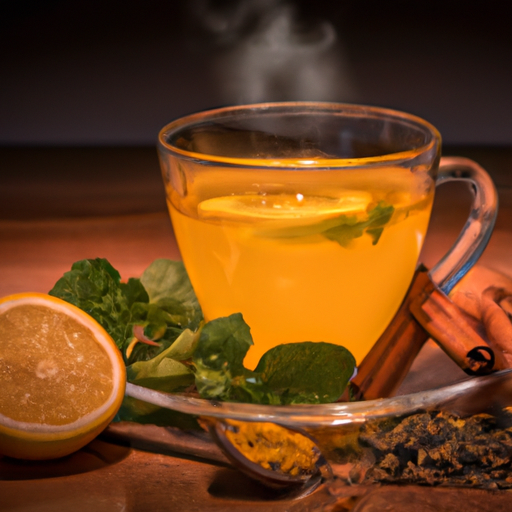I’ve been searching for a tasty and nutritious tea that can enhance my immunity, and I discovered turmeric tea. This old spice originating from India has centuries of use both in cooking and as a remedy, and is celebrated for its anti-inflammatory benefits.
With all the health benefits that come with drinking turmeric tea, I was eager to try it out. But then came the question: where can I buy turmeric tea in the Philippines?
After doing some research, I found out that there are actually several places where you can purchase turmeric tea in the country. From specialty stores to online shops, there are various options available depending on your preference and budget.
In this article, I’ll be sharing with you some of the places where you can find turmeric tea in the Philippines, as well as some tips on how to make your own homemade version. So whether you’re a seasoned tea drinker or simply looking to try something new and healthy, read on!
Key Takeaways
- Turmeric tea can be brewed using fresh or dried turmeric root or powder, and can be infused with other ingredients like ginger, cinnamon, lemongrass, or coconut milk.
- Turmeric tea offers a range of health benefits, including boosting the immune system, reducing inflammation, improving brain function, and reducing the risk of heart disease.
- Turmeric tea is readily available in the Philippines, with options at supermarkets like SM, Robinsons, Puregold, and Rustan’s, as well as specialty food markets like S&R Membership Shopping and small businesses like farmers’ markets and street vendors.
- When consuming turmeric tea, it is important to pay attention to preparation and consumption instructions, and to consume in moderation to avoid gastrointestinal issues or interactions with certain medications. Reputable retailers should be chosen when shopping online.
Health Benefits of Turmeric Tea
If you’re looking for a tasty way to boost your immune system and reduce inflammation, turmeric tea is definitely worth trying! Not only does it taste great, but it also has numerous health benefits.
Turmeric contains a compound called curcumin, which has been shown to have anti-inflammatory properties. This means that drinking turmeric tea can help reduce joint pain and stiffness caused by inflammation.
In addition to reducing inflammation, turmeric tea may also have other health benefits. Studies have shown that curcumin may help improve brain function and reduce the risk of heart disease. It’s important to note, however, that more research is needed in these areas.
When brewing turmeric tea, there are a few different techniques you can use. One popular method involves simmering fresh or dried turmeric root in water for several minutes before adding other ingredients like ginger or honey. Another option is to steep turmeric powder in hot water for several minutes before straining and enjoying. No matter which method you choose, be sure to add a pinch of black pepper – this will help your body absorb the curcumin more effectively.
If you’re intrigued by the health benefits of turmeric tea and want to try it for yourself, keep reading! In the next section, we’ll explore some delicious flavors of turmeric tea that you can enjoy at home.
Turmeric Tea Flavors
You can try out different flavors of this healthy tea like ginger or cinnamon, can’t you? Turmeric tea blends are becoming more popular as people discover the benefits of this spice.
Infused turmeric tea varieties offer a unique taste experience that is both refreshing and satisfying. If you’re looking for a spicy kick, a ginger-turmeric blend might be just what you need. This combination provides an extra boost to your immune system while soothing inflammation in the body.
Cinnamon-turmeric blends, on the other hand, offer a sweeter taste profile that’s perfect for those who prefer milder flavors. For something truly exotic, try turmeric tea with lemongrass or coconut milk. These infusions add a depth and complexity to the flavor that will leave your taste buds craving more.
And with all the health benefits of turmeric, these teas are not only delicious but also good for you. So why settle for plain old tea when there are so many exciting infused turmeric tea varieties out there? Head to your nearest specialty store or check online for some amazing options. You won’t regret it!
Tea Shops and Specialty Stores
Looking for a unique tea experience? Check out your local specialty store or tea shop for some exciting infused turmeric tea varieties. These tea blends are carefully crafted with the perfect balance of turmeric and other natural ingredients that make each sip a delightful experience.
Some popular flavors include ginger and honey, lemon and honey, and green tea with turmeric. When brewing your turmeric tea at home, it’s important to use fresh ingredients and follow some simple tips to get the best flavor. First, boil water in a kettle or pot until it reaches 205°F. Then, add one teaspoon of loose leaf turmeric tea per cup of water into an infuser or strainer. Let it steep for 5-10 minutes before removing the infuser/strainer and serving hot or cold.
While shopping at physical stores is always a great option, online stores offer even more variety when it comes to finding unique turmeric tea blends. These online stores offer different packaging sizes that can fit any budget as well as customer reviews that help you make informed purchasing decisions. Plus, many online vendors offer free shipping on orders above a certain amount – making your shopping experience much more convenient!
Online Stores
Online stores offer an abundance of options for purchasing unique and flavorful turmeric tea blends. Some online retailers specialize in offering organic, non-GMO, and Fair Trade certified turmeric teas that are sourced directly from small farms in Asia. These types of teas are not only delicious but also provide a range of potential health benefits due to their high levels of antioxidants and anti-inflammatory compounds.
When shopping online for turmeric tea, it’s important to pay attention to the preparation and consumption instructions provided by the retailer. While turmeric is generally considered safe when consumed in moderate amounts, excessive intake may cause gastrointestinal issues or interact with certain medications. Additionally, some blends may contain additional ingredients such as black pepper which can enhance absorption but may also cause adverse reactions in some individuals.
If you’re interested in exploring the benefits of turmeric tea but prefer to shop at natural and organic stores rather than online retailers, there are many options available throughout the Philippines. These stores typically carry a selection of loose-leaf teas including varieties made with fresh ginger, lemongrass, or cinnamon which can be combined with turmeric for added flavor and health benefits.
Natural and Organic Stores
I love exploring natural and organic stores in the Philippines because they offer a wide range of products that cater to my healthy lifestyle.
Some of my go-to places include Healthy Options, The Green Company, and The Superfood Grocer.
These stores offer premium quality products such as superfoods, supplements, and personal care items that are all-natural, organic, and eco-friendly.
Healthy Options
You’ll love the selection of turmeric tea at Healthy Options in the Philippines! As a health-conscious individual, I often visit this store to find healthy drinks and wellness products. Here are some reasons why Healthy Options is the go-to store for turmeric tea:
- Wide variety: From loose leaf to tea bags, you can find different types of turmeric tea at Healthy Options.
- Organic options: The store offers a range of organic and natural teas that are free from harmful chemicals.
- High-quality ingredients: All of their turmeric teas are made using high-quality ingredients to ensure maximum health benefits.
- Knowledgeable staff: If you’re unsure about which type of turmeric tea is best for you, the knowledgeable staff at Healthy Options can help you make an informed decision.
If you’re looking for other natural and healthy products, such as supplements or snacks, Healthy Options also has a great selection.
Now let’s move on to learning more about another green company in the Philippines – The Green Company.
The Green Company
The Green Company offers eco-friendly options for everyday products, such as bamboo toothbrushes and reusable straws, to help reduce plastic waste. Their products are made with sustainable sourcing practices that prioritize the environment. By making small changes in our daily habits, we can make a big impact on the planet.
For example, Maria, a customer of The Green Company, switched to using their bamboo toothbrush and was able to reduce her plastic waste by 50% within a month.
In addition to their eco-friendly product offerings, The Green Company also has turmeric tea available for purchase. This tea is made with organic ingredients and comes in biodegradable packaging to ensure minimal environmental impact.
As someone who values both health and sustainability, I appreciate The Green Company’s commitment to offering products that align with my values. Moving forward into the next section about ‘the superfood grocer’, I’m excited to explore more options for incorporating healthy and sustainable choices into my lifestyle.
The Superfood Grocer
Looking for healthy options to add to your diet? Check out The Superfood Grocer! They offer organic and locally-sourced superfoods to help boost your health and well-being.
They have a wide range of products, including turmeric tea. This tea is not only delicious, but also packed with antioxidants and anti-inflammatory properties. It can help boost immunity, improve digestion, and reduce inflammation in the body.
The Superfood Grocer provides different recipes using turmeric as an ingredient so you can enjoy its benefits in various ways. You can try their Turmeric Ginger Tea recipe or even use it as an ingredient in smoothies or dishes like curries.
If you’re wondering where to find these products, don’t worry! The next section will discuss some supermarkets where you can purchase them.
Supermarkets
Hey, if you’re ever craving some turmeric tea, supermarkets in the Philippines carry a great selection! From SM Supermarket and Robinsons Supermarket to Puregold and Rustan’s Supermarket, you can find different brands of turmeric tea on their shelves.
The best thing about buying from these supermarkets is that you get the convenience of finding everything you need in one place. Supermarket availability also means that there is competition among brands, which results in better prices for consumers. You can easily compare prices of different brands and choose the one that fits your budget, whether you prefer loose leaf or tea bags, organic or non-organic.
There’s always something for everyone. If you’re not sure where to start looking for turmeric tea in these supermarkets, don’t hesitate to ask store personnel for assistance. They’ll be happy to help direct you to the right aisle or recommend a brand based on your preferences.
However, if you’re looking for unique blends or want to support local vendors instead, look no further than local markets and vendors. Local markets and vendors offer a more personalized shopping experience where you can interact with the makers themselves and get insider tips on how to brew the perfect cup of turmeric tea.
Local Markets and Vendors
When it comes to finding unique and local food products, I always turn to the farmers’ markets, street vendors, and specialty food markets.
These places offer a diverse range of fresh produce, artisanal goods, and homemade delicacies that reflect the culture and tradition of the community.
Whether you’re looking for exotic spices like turmeric tea or seasonal fruits and vegetables, these local markets are a great place to discover new flavors and support small businesses.
Farmers’ Markets
You can easily find turmeric tea at farmers’ markets in the Philippines, where local vendors offer a wide variety of fresh produce and herbal blends. These markets are not only great for finding unique products like turmeric tea, but they also provide benefits for farmers and support the local economy. By purchasing from these vendors, you’re directly supporting small-scale farmers who rely on these markets to sell their goods.
At farmers’ markets, you can expect to find high-quality turmeric tea that’s made with locally sourced ingredients. The vendors take pride in their products and often have a wealth of knowledge about the health benefits of each ingredient.
Additionally, shopping at farmers’ markets allows you to connect with the community and learn more about traditional Filipino foods and remedies. However, if you’re unable to make it to a farmers’ market, don’t worry! You can also find turmeric tea being sold by street vendors throughout the country.
Street Vendors
If you’re looking for a more immersive experience in Filipino culture, wandering the streets and stumbling upon local street vendors selling their homemade goods can be a great way to discover new flavors and remedies.
When it comes to turmeric tea, street vendor availability may vary depending on the location. However, in most major cities like Manila and Cebu, you can easily find street vendors selling turmeric tea for as low as Php 20 (less than $0.50) per cup.
Compared to specialty food markets or online stores that sell packaged turmeric tea, buying from street vendors is much cheaper. You also get to witness the preparation process of your drink right before your eyes. Plus, some vendors add other natural ingredients like ginger or calamansi juice to enhance the flavor and health benefits of the tea.
But if you prefer a wider selection of turmeric-based products or want to buy in bulk, specialty food markets might be a better option for you.
Specialty Food Markets
I didn’t have much luck finding turmeric tea from street vendors, so I decided to try my luck at specialty food markets. These markets offer a wide range of specialty products that you can’t find in regular supermarkets. They usually have a section dedicated to herbal teas and other health drinks, which makes them the perfect place to source turmeric tea.
One of the best things about specialty food markets is that they provide various sourcing options for their customers. Some sell pre-packaged turmeric tea bags, while others offer loose-leaf options where you can buy as much or as little as you need. To give you an idea of what to expect when visiting these specialty food markets, here’s a table detailing some popular ones in the Philippines:
| Specialty Food Market | Location | Turmeric Tea Options |
|---|---|---|
| Healthy Options | Nationwide branches | Pre-Packaged Bags and Loose Leaf |
| The Green Grocer | Makati City | Loose Leaf Only |
| S&R Membership Shopping | Nationwide branches | Pre-Packaged Bags Only |
With these options available, it’s easy to find what works best for your needs and budget. So head on over to the nearest specialty food market and stock up on some turmeric tea!
Now that we know where we can buy turmeric tea, let’s move on to creating our own delicious brew with some simple recipes.
Turmeric Tea Recipes
Looking for a calming and healthy tea option? Try whipping up some turmeric tea with this simple recipe, which has been said to have anti-inflammatory properties.
Turmeric is a spice commonly used in Indian and Middle Eastern cuisine, but it can also make for a delicious and healthful beverage when brewed as a tea. Some of the benefits of drinking turmeric tea include reducing inflammation, improving brain function, and aiding digestion.
To make your own turmeric tea, start by bringing 4 cups of water to a boil in a pot. Add 1 tablespoon of grated fresh turmeric root or 2 teaspoons of ground turmeric powder to the boiling water. Reduce the heat and let the mixture simmer for about 10 minutes until the water turns bright yellow. Strain out any remaining pieces of ginger or other debris from the liquid using a fine mesh strainer or cheesecloth.
Once you’ve made your own batch of homemade turmeric tea, you may be curious about trying out some store-bought brands as well. Stay tuned for our next section on where to find quality turmeric teas in the Philippines!
Turmeric Tea Brands in the Philippines
You can discover some fantastic turmeric tea brands in the Philippines that are sure to impress your taste buds. Turmeric tea has been gaining popularity in recent years due to its health benefits, such as reducing inflammation and improving digestion.
One of the most popular brands is The Tea Farm, which offers a variety of blends including their signature Turmeric Ginger blend. This brand uses high-quality ingredients and carefully curated recipes to provide a unique taste experience.
Another great option is Golden Turmeric Tea by Pure Earth, which contains organic turmeric powder and black pepper for maximum absorption of curcumin – the active ingredient in turmeric that provides its many health benefits. This brand also adds cinnamon, ginger, and cardamom for a deliciously spicy flavor. Their tea bags are individually wrapped for convenience and freshness.
Lastly, Yogi Tea’s Turmeric Chai offers a unique spin on traditional chai with the addition of turmeric and other spices like cinnamon, cardamom, and ginger. This brand is known for using only organic ingredients in their teas and prioritizing sustainability in their packaging materials. With its warming spiciness and potent anti-inflammatory benefits, this turmeric chai blend is perfect for cozying up on a chilly night or soothing an upset stomach.
There are several excellent turmeric tea brands available in the Philippines that offer various blends with different tastes and health benefits. Whether you prefer something spicy or sweetened with honey or coconut milk, these brands have got you covered with their quality ingredients and expertly crafted recipes. So go ahead – give one (or all!) of these brands a try and reap the many benefits of this powerful root herb!
Frequently Asked Questions
What are the potential side effects of consuming turmeric tea?
When it comes to turmeric tea, there are some potential side effects and precautions that you should be aware of before consuming it.
Some people may experience gastrointestinal issues such as nausea, diarrhea, or stomach pain. Additionally, turmeric can thin the blood and increase the risk of bleeding, so it’s important to avoid consuming large amounts if you’re taking blood-thinning medication or have a bleeding disorder.
It’s also recommended to start with a small dose and gradually increase over time to avoid any adverse reactions. As for dosage recommendations, most studies suggest consuming up to 500 mg of curcumin (the active ingredient in turmeric) per day is safe for most adults.
However, always consult with your healthcare provider before adding any new supplement to your diet.
Can turmeric tea be consumed during pregnancy?
Pregnancy is a delicate time for women, and every decision they make affects their unborn child. When it comes to consuming turmeric tea during pregnancy, experts have mixed opinions.
Some studies suggest that turmeric tea may help alleviate symptoms of morning sickness and provide anti-inflammatory benefits, while others warn against its consumption due to potential risks of premature contractions or bleeding.
Similarly, breastfeeding mothers should be cautious about drinking turmeric tea as well. It’s always best to consult with your doctor before trying any new foods or drinks during pregnancy or while breastfeeding.
As with everything in life, moderation is key – so if you do decide to consume turmeric tea during this time, it’s important to drink it in moderation. Remember: when it comes to the health of you and your baby, it’s always better to err on the side of caution!
How much turmeric should be used per cup of tea?
When making turmeric tea, the amount of turmeric to use per cup can depend on personal preference and the strength of the turmeric being used. Generally, 1 teaspoon of ground turmeric or 1 tablespoon of grated fresh turmeric per cup of water is a good starting point. It’s important to note that using too much turmeric can result in an overly bitter taste.
To brew the perfect cup of turmeric tea, it’s recommended to bring water and turmeric to a boil before simmering for 10 minutes. Adding black pepper and a touch of honey or lemon juice can also enhance the flavor and health benefits. Remember to strain out any ginger pieces if using fresh grated ginger as well.
Is it recommended to add any other ingredients to turmeric tea for maximum health benefits?
Oh, you wanna know if there are any additional ingredients that can be added to turmeric tea for maximum health benefits? Well, of course not! Why would anyone wanna add anything to this golden elixir of health and wellness?
Just kidding, there are actually quite a few flavor variations and additional ingredients that can be incorporated into turmeric tea to enhance its already impressive health benefits. Some popular options include ginger, honey, lemon, cinnamon, black pepper, and cardamom.
Each ingredient has its own unique properties that can further boost the anti-inflammatory and antioxidant effects of turmeric. So go ahead and experiment with different combinations until you find your perfect cup of healthy goodness.
How long should turmeric tea be steeped for optimal flavor and health benefits?
To fully reap the benefits of turmeric tea, it’s important to steep it for an optimal amount of time. Generally, I recommend steeping turmeric tea for around 10-15 minutes to allow the flavors and nutrients to fully infuse into the water.
However, different recipes for turmeric tea may vary in steeping times depending on additional ingredients used. For example, if adding ginger or black pepper to your recipe, you may want to extend the steeping time by a few minutes.
Ultimately, finding your preferred taste and strength is key when making turmeric tea. Not only does it offer a warm and comforting drink option but also has various health benefits such as reducing inflammation and boosting immunity.
Conclusion
Overall, I’ve found that turmeric tea is widely available in the Philippines. It can be purchased from specialty stores, online shops, supermarkets, natural and organic stores, as well as local markets and vendors.
The health benefits of turmeric tea are numerous and it comes in a variety of flavors to suit different tastes.
In conclusion, if you’re looking to buy turmeric tea in the Philippines, there are many options available to you. Whether you prefer to shop online or visit a physical store, you shouldn’t have any trouble finding this wonderful beverage. So why not give it a try? With its many health benefits and delicious flavor options, turmeric tea is sure to become your new favorite drink. As they say, "a cup of turmeric tea a day keeps the doctor away".










